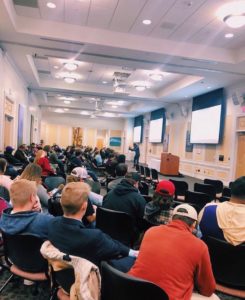Co-written with Allyson Wainright

The first Whee Talks was a success. Photo by WCU SGA.
Ted Talks are conferences held all around the world designed to spread ideas, covering topics ranging from business to global issues to psychology. They are meant to inspire, and inspire they did as WCU Student Government Association (SGA) decided to create their own version called Whee Talks.
The first “Whee Talks” kicked off with Dr. Michael Lenz, political science professor at Western Carolina University who discussed the revival of the hippie counterculture on Dec. 5. Lenz filled the Blue Ridge Conference Center with over 50 eager young adults with a craving to change the world.
“A person who consciously tries to attain personal or spiritual liberation through practicing the values of soulful expression, peaceful cohabitation, charity, independence and reverence for the Earth. A hippie also seeks to return to a more natural and less mechanical way of living in unity with nature,” Lenz said when giving his definition of a hippie during WCU’s own version of a Ted Talk.
Hear what the students thought about the speaker and the event.
The “Whee Talks” series is a platform designed for students by students to broaden worldly intelligence to members of the WCU community, faculty, and staff.
The idea was first proposed by Troi Davis, SGA Director of Diversity and Inclusion Excellence, as a way to bring diversity to our student body. She made a rough draft of the guidelines and brought it to Matt Opinski, SGA president. Together, they worked on a detailed guidelines and discussed what they wanted this series to be. Davis thought of the idea during a conversation she was having in a meeting with Ricardo Nazario-Colon, the Chief Diversity Officer at WCU.
“Originally, I wanted to just do a Ted Talk here and go through the process of getting a license and such, but that’s when [Nazario-Colon] suggested the idea of making this event designed for members of the WCU community,” Davis said.
The first of its kind, this first talk will act as a trial run to see what people like and if this series appears to gain popularity. In future years to come, there will be an application process with a committee team to review and choose two to four applicants to present their ideas Opinski explained.
“I’m excited that there is so much potential for this to educate our students in ways they’ve never been educated before,” Opinski said.
The application process will be open to students, community members and faculty.
Students will gain a chance to improve their public speaking skills and faculty will have a chance to present their research.
These talks will allow the community to have a free outlet for intellectual conversations. In addition to the reasons listed above, these talks will also provide the opportunity to engage with the institution.
“It is important we have programs and events such as these on campus because I know students, faculty, and staff are always looking for new ways to get their voices out there or share something exciting. So, why not give them what they need? A platform to share these thoughts and ideas with our community,” Davis said.

Free lollipops SGA gave out during the Whee Talk Mike Lenz: Revival of the Hippie Counterculture. Photographed by Allyson Wainright, junior at WCU
For future talks, topics will be chosen based on the climate of the institution and what the students need.
“Addressing conversations that we don’t necessarily have in our academic classes, like issues with racism or issues in the queer community, conflict that we should be discussing, but we haven’t really have an outlet to do that, until now,” Opinski said.
The talks are free and future talks will be live streamed, might have food and there is even the potential for an end of year discussions with all the speakers and attendees.
“It’s humbling and empowering,” Opinski said when asked about what hosting this event meant to him. “As student body president I have a lot of potential to make some great changes to the university and improve the student experience and these talks are, in my opinion, going to help students reach a level of intelligence that we have yet to see at Western.”


